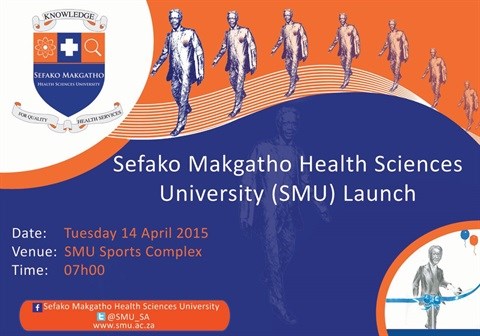
Top stories






More news













Logistics & Transport
Uganda plans new rail link to Tanzania for mineral export boost












The new Sefako Makgatho Health Science University (SMU), which was launched in Pretoria, on the premises of the old Medical University of Southern Africa (Medunsa), is a comprehensive university offering certificates, diplomas, degrees and post-graduate programmes.
The president said the new university is the first of its kind in the country.
"We are making history today because this is the first stand-alone health sciences university to be established in the country," he said on Tuesday.
President Zuma said the launch illustrated that government will continue to invest in education and skills as the key to economic growth and development.
He said SMU is set to recruit only the best and will produce the best health professionals needed in South Africa.
"South Africa today is faced with an extensive shortage and an inadequate distribution of health professionals. We have an undersupply of new and appropriately trained health science graduates which is why we need to focus intensively on producing this important health professional core," he said.
President Zuma said the establishment of SMU provides an excellent opportunity for the development and training of a new generation of health professionals, who will make a positive impact on the lives and livelihoods of the many South Africans still marginalised by poverty and lack of access to health services.
He said the new university, unlike Medunsa, will go beyond only training medical doctors and produce other health professionals such as dentists, nurses, physiotherapists, medical technologists, radiographers, and so on.
"The establishment also supplements current initiatives to increase and expand the capacity of higher education institutions, and to substantially increase access to higher learning over the next 15 to 20 years, to reach the expected participation rate of 25% by 2030," said President Zuma.
The university has currently enrolled 5,034 students and its projected growth for is 7,000 students by 2019, and 10,000 students by 2024.
President Zuma said the university will recruit students from communities with the greatest health care needs, and provide innovative training programmes, including distance programmes which will provide students from all over the country with access to quality health care education.
President Zuma said an amount of more than R298 million has been allocated in the form of a university subsidy for the 2015/16 financial year to support the university operations.
The President also said government has an additional amount of R210 million to support the establishment of the new university.
"We are pleased to be adding this new expanded institution to our higher education sector. Last year, we established the Sol Plaatje University in the Northern Cape and the University of Mpumalanga to expand access to education to all provinces," said President Zuma.
The two provinces had not had universities before. He said government is committed to ensure that the large numbers of youth are given post school education and training opportunities that will improve their employability.
"We are really forging ahead in providing more opportunities and a better future for our youth and our people in general," said the president.
The President said universities must ensure that they offer the range of courses and programmes that meet the needs of the economy.
"We also encourage our learners to take up mathematics and science as more opportunities are now available for further study for them in this field. We are also investing in teacher training so that we can produce students for Sefako Makgatho from our high schools," said President Zuma.
Amongst dignitaries who attended the launch was Higher Education and Training Minister Blade Nzimande, who reiterated the President's message, saying the university must aim to be judged against the best in the world.
He said the department has started making funding available for Masters and PhD Students but did not receive anticipated number of applications from students. The department has set aside about R145 million available for prospective academics.
He said the department is also going to make funding available for entry level posts at the universities across the board.
"They are going to sign an agreement that says, if we have supported you as government for three years you are going to come back and teach at a university for three years, we will create a post for you," he said.
Chairperson of SMU Interim Council, Professor Olive Shisana, said about 15 new programmes will in the future be introduced and offered by the University to address gaps identified in the South African health sector.
She said although the university will be leading with health science programmes, it will not kill what other universities are currently offering.
Shisana said the university is developing relationships with various international institutions of higher learning.
"We brought in an international advisory committee which includes people from universities in Brazil, Washington, Uganda and President of the Medical Council in South Africa, among others. We did this because this university is expected to provide trainees who are going to support the health system that is coming up.
"By developing this relationship with them, we have been able to identify courses that we can gather that are well proven that they have been used internationally and are generic enough to be applicable to any country," she said.
Shisana said the university will also offer short courses for professionals who are already practicing in the medical and health field to expand their skills and knowledge.

SAnews.gov.za is a South African government news service, published by the Government Communication and Information System (GCIS). SAnews.gov.za (formerly BuaNews) was established to provide quick and easy access to articles and feature stories aimed at keeping the public informed about the implementation of government mandates.
Go to: http://www.sanews.gov.za